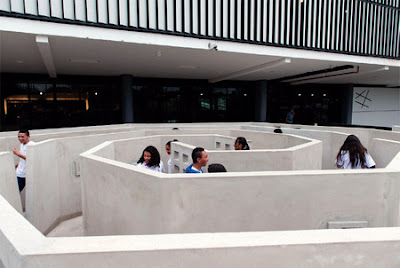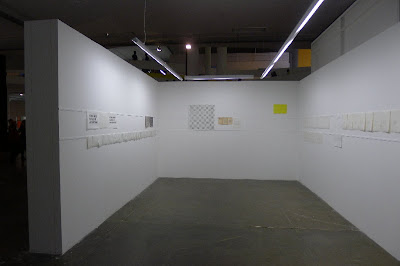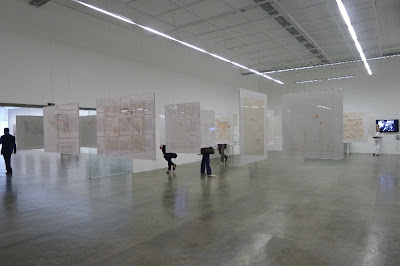
30th Sao Paulo Bienal, The Imminence of Poetics, view from the entrance to the bienal building
Waldemar Cordeiro


Alexandre da Cunha
Alejandro Cesarco
friendly bienal security



and the interior ramps and columns of Niemeyer's Sao Paulo Bienal building
30th Bienal de São Paulo, The Imminence of Poetics
Luis Pérez-Oramas
Curator
The 30th Bienal de São Paulo, The Imminence of Poetics, has no theme. The articulation of the ideas of imminence and poetics is, for us, the curators of the 30th, a “motif.” The difference between “theme” and “motif” is important: “theme” means content and thesis, while “motif” is a pretext, the point of departure for a series of questions and for the establishment of a discursive strategy. It is not our intention for the artists invited to “illustrate” or “represent” our motif. We merely want their works to resonate with the constellation of questions that may be deduced from such motif: how does contemporary art, and what is left of the legacy of modernity, “function” in a world of imminences, of happenings yet to occur, increasingly characterized by unpredictability? How does artistic practice respond with poetic, expressive, discursive, enunciative and vocal decisions?
The work of the curator is not that of a historian. The Imminence of Poetics is presented as a discursive device, itself tentative and experimental, in which bonds, relations and constellational forces between works and artists, performative events and thoughts prevail. The 30th Bienal does not intend to affirm itself with definitive, orthodox or messianic responses, instead aspires to present a discussion in permanent imminence. The curators of the 30th are not making history: they are merely trying to contribute to the construction of the present, employing analogies and dialogue in an unbiased manner.
Novelty, in and of itself, does not interest us. What interests us is offering a look at artistic “processes,” conscious of the fact that we are living a critical moment in time in which the 20th and 21st century overlap.
Survivals, Alterforms, Drifts and Voices were the conceptual units that allowed us to direct our gaze and our research and investigation. The challenge of a curatorship does not consist, in translating an idea, but rather of “inventing itself” in real space. We have developed a constellational Bienal, inside and outside the Ibirapuera Pavilion: the public will find a series of selections of works by each artist, organized in constellation, linked to the neighboring selections, some of the presentations with a quasi-retrospective character..
The artists participating in the 30th Bienal have been selected for their distinct voices, because they speak, or do not speak, of one thing or few things, not of everything or everyone. The artists participating in the 30th are not experts, they are artists: they appear, keep silent or speak from the same dark echo in which the doubts and gray certainties of existence resonate: the archipelagic density of life: their place and their non-place; their in-between. The artists have been selected because of their attention to things that is different to the reign of the image. In their works, in addition to acknowledging the distance between things and words, images exist as spheres of questioning – including in the documental evidence – of the impossible identity between images and the world. The artists bear testimony, in their works, to life or to living memory: they believe in shadows, in traces, and in the body as a unique archive for survival, alterform, drift and voice. The artists in The Imminence of Poetics are all contemporary: the imminence of poetics is nothing other than this: there, in their niche, becoming contemporary: greeting the dawn with shadows in the flight of light, with the word on the tip of one’s tongue with sound or silence, and all their potential.
The constellational dimension of the Bienal lies, after all, in the eyes and mind of each and every spectator, inasmuch as they open themselves up to the experience of the Bienal. For this, the Bienal’s discursive tools, such as the exhibition, the catalogue, the publications, the visual identity, such as this SITE, are fundamental: we aspire to clarity and functionality, and just as our team of architects has kept open views in order to offer a dimension of transparency inside the pavilion, the architecture of this SITE is intended to be coherent with this fluidity.
The Imminence of Poetics hopes to provide insights that produce meaning, insights that develop from itself and alongside intelligence and the gaze of others.
Curatorship
Luis Pérez-Oramas, Curator
André Severo, Associate Curator
Tobi Maier, Associate Curator
Isabela Villanueva, Assistant Curator
Guest Curators
Ariel Jimenez (Roberto Obregón)
Helena Tatay (Hans-Peter Feldmann)
Susanne Pfeffer (Absalon)
Vasco Szinetar (Alfredo Cortina)
Wilson Lazaro (Arthur Bispo do Rosário)
Curatorial Advice
Andre Magnin (Frédéric Bruly Bouabré, Ambroise Ngaimoko-Studio 3Z)
Beatrix Ruf (Mark Morrisroe)
Joaquim Paiva (Alair Gomes)
John Rajchman (Fernand Deligny, Xu Bing)
Justo Pastor Mellado (Ciudad Abierta)
Luciana Muniz (Alair Gomes)
Micah Silver & Robert The (Maryanne Amacher)
Pia Simig (Ian Hamilton Finlay)
Sandra Alvarez de Toledo (Fernand Deligny)
Teresa Gruber (Mark Morrisroe)
www.30bienal.org.br



and the interior ramps and columns of Niemeyer's Sao Paulo Bienal building
30th Bienal de São Paulo, The Imminence of Poetics
Luis Pérez-Oramas
Curator
The 30th Bienal de São Paulo, The Imminence of Poetics, has no theme. The articulation of the ideas of imminence and poetics is, for us, the curators of the 30th, a “motif.” The difference between “theme” and “motif” is important: “theme” means content and thesis, while “motif” is a pretext, the point of departure for a series of questions and for the establishment of a discursive strategy. It is not our intention for the artists invited to “illustrate” or “represent” our motif. We merely want their works to resonate with the constellation of questions that may be deduced from such motif: how does contemporary art, and what is left of the legacy of modernity, “function” in a world of imminences, of happenings yet to occur, increasingly characterized by unpredictability? How does artistic practice respond with poetic, expressive, discursive, enunciative and vocal decisions?
The work of the curator is not that of a historian. The Imminence of Poetics is presented as a discursive device, itself tentative and experimental, in which bonds, relations and constellational forces between works and artists, performative events and thoughts prevail. The 30th Bienal does not intend to affirm itself with definitive, orthodox or messianic responses, instead aspires to present a discussion in permanent imminence. The curators of the 30th are not making history: they are merely trying to contribute to the construction of the present, employing analogies and dialogue in an unbiased manner.
Novelty, in and of itself, does not interest us. What interests us is offering a look at artistic “processes,” conscious of the fact that we are living a critical moment in time in which the 20th and 21st century overlap.
Survivals, Alterforms, Drifts and Voices were the conceptual units that allowed us to direct our gaze and our research and investigation. The challenge of a curatorship does not consist, in translating an idea, but rather of “inventing itself” in real space. We have developed a constellational Bienal, inside and outside the Ibirapuera Pavilion: the public will find a series of selections of works by each artist, organized in constellation, linked to the neighboring selections, some of the presentations with a quasi-retrospective character..
The artists participating in the 30th Bienal have been selected for their distinct voices, because they speak, or do not speak, of one thing or few things, not of everything or everyone. The artists participating in the 30th are not experts, they are artists: they appear, keep silent or speak from the same dark echo in which the doubts and gray certainties of existence resonate: the archipelagic density of life: their place and their non-place; their in-between. The artists have been selected because of their attention to things that is different to the reign of the image. In their works, in addition to acknowledging the distance between things and words, images exist as spheres of questioning – including in the documental evidence – of the impossible identity between images and the world. The artists bear testimony, in their works, to life or to living memory: they believe in shadows, in traces, and in the body as a unique archive for survival, alterform, drift and voice. The artists in The Imminence of Poetics are all contemporary: the imminence of poetics is nothing other than this: there, in their niche, becoming contemporary: greeting the dawn with shadows in the flight of light, with the word on the tip of one’s tongue with sound or silence, and all their potential.
The constellational dimension of the Bienal lies, after all, in the eyes and mind of each and every spectator, inasmuch as they open themselves up to the experience of the Bienal. For this, the Bienal’s discursive tools, such as the exhibition, the catalogue, the publications, the visual identity, such as this SITE, are fundamental: we aspire to clarity and functionality, and just as our team of architects has kept open views in order to offer a dimension of transparency inside the pavilion, the architecture of this SITE is intended to be coherent with this fluidity.
The Imminence of Poetics hopes to provide insights that produce meaning, insights that develop from itself and alongside intelligence and the gaze of others.
Curatorship
Luis Pérez-Oramas, Curator
André Severo, Associate Curator
Tobi Maier, Associate Curator
Isabela Villanueva, Assistant Curator
Guest Curators
Ariel Jimenez (Roberto Obregón)
Helena Tatay (Hans-Peter Feldmann)
Susanne Pfeffer (Absalon)
Vasco Szinetar (Alfredo Cortina)
Wilson Lazaro (Arthur Bispo do Rosário)
Curatorial Advice
Andre Magnin (Frédéric Bruly Bouabré, Ambroise Ngaimoko-Studio 3Z)
Beatrix Ruf (Mark Morrisroe)
Joaquim Paiva (Alair Gomes)
John Rajchman (Fernand Deligny, Xu Bing)
Justo Pastor Mellado (Ciudad Abierta)
Luciana Muniz (Alair Gomes)
Micah Silver & Robert The (Maryanne Amacher)
Pia Simig (Ian Hamilton Finlay)
Sandra Alvarez de Toledo (Fernand Deligny)
Teresa Gruber (Mark Morrisroe)
www.30bienal.org.br

























































































































No comments:
Post a Comment